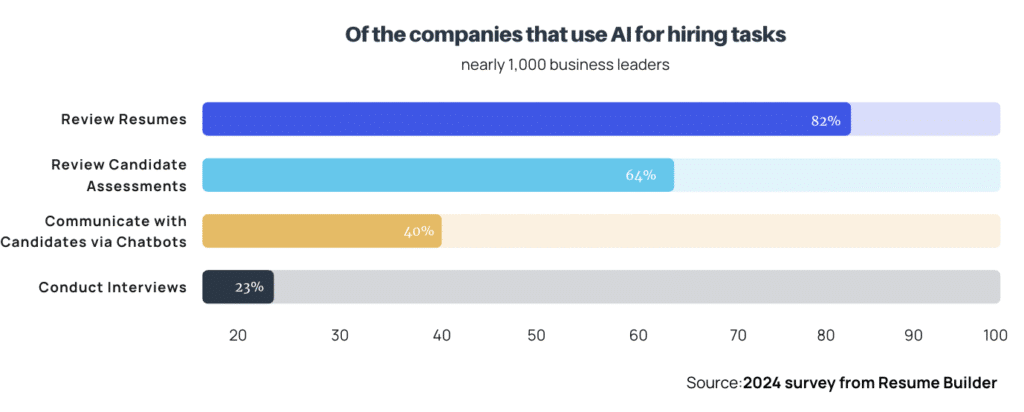AI and HR: How AI is Transforming the Way We Recruit and Hire

Like many other aspects of the American workplace, AI now plays a significant role in assisting human resources departments with common tasks. HR was among the first departments in organizations to regularly utilize AI to perform duties easily offloaded to such tools, such as creating job descriptions and writing company-wide emails.
Today AI has gone beyond these simple tasks to play a much larger role in HR operations. This is especially true of HR professionals who are responsible for recruiting and hiring new employees. It is now common for recruiters and hiring managers to use AI to screen resumes, evaluate applications, conduct social media background checks, evaluate assessments, and—in a growing number of companies—conduct candidate interviews.
According to a 2024 survey from Resume Builder of nearly 1,000 business leaders, more than half (51%) of companies now use AI in their hiring process, and 68% say they will be doing so by the end of 2025. Of the companies that use AI for hiring tasks:
So how much does AI ultimately influence hiring decisions? More than many might think:
- 50% of business leaders say they use AI only for rejections at the initial resume-screening stage.
- 21% say they automatically reject candidates at all stages of the hiring process without human review.
- 29% say they maintain human oversight for all rejection decisions.
What do hiring managers think of AI assuming so many of their traditional responsibilities? A 2025 Resume Builder survey of 1,000 hiring managers across the U.S. found a lot of support for the technology from those in the field:
- 78% say AI makes hiring faster and more efficient.
- 75% say AI helps them find stronger candidates.
- 69% believe AI will significantly impact hiring in 2025.
Too Many Candidates, Too Few Jobs
The World Economic Forum, an international organization for public/private cooperation, notes that Goldman Sachs received 315,126 applications for its 2024 summer internship program, Google received more than 3 million applications for its program, and McKinsey received more than 1 million.
“The sheer volume of job applications from various talent pools is too vast for human recruiters to manage effectively,” according to a 2025 article published by the World Economic Forum. “Further, recruiters often struggle because many applicants exaggerate or misrepresent their skills, making it nearly impossible to assess candidates at scale. As a result, truly qualified and talented individuals often get lost in the crowd.”
“As organizations face an overwhelming influx of resumes, especially with the expansion of remote and hybrid work models, more companies are leveraging AI in the hiring process,” agrees Stacie Haller, Resume Builder’s chief career advisor. “These models have broadened the talent pool, allowing candidates from various geographic locations to apply, resulting in an exponential increase in applications for every open position.”
Doubts Remain
However, according to the ResumeBuilder survey of business leaders, some organization heads have reservations about the effectiveness of AI in hiring:
- 34% say AI tools sometimes produce biased results based on age, socioeconomic status, gender, or race and ethnicity; 24% say using AI tools often produces biased results.
- 56% worry AI could screen out qualified candidates.
- 48% are concerned about a lack of human oversight when using AI tools.
DemandSage—a consulting company that uses data to help businesses make informed decisions about their long-term growth—notes that a survey of recruiters also reveals some significant doubts about the role of AI in HR. While 44% of recruiters say that AI helps them save time and 58% say it improves candidate sourcing, a sizeable minority also harbors significant reservations about where AI is going. Approximately 35% say they worry that AI may exclude candidates with unique skills and experiences, and more than a quarter of recruiters believe that using AI recruitment “could potentially destroy the HR industry” by replacing it.
The fear that AI will replace HR is often rooted in studies attesting to the increased efficiency and cost savings often attributed to AI. In an article published by the World Economic Forum, authors Utkarsh Amitabh, founder of Network Capital (a mentorship platform for students and young professionals), and Ali Ansari, founder and CEO of micro1 (a provider of AI recruitment tools), describe the results of their analysis of AI performance in hiring tasks.
“In one representative scenario, using conversational AI in hiring led to an 87.64% reduction in financial costs compared to traditional methods,” write Amitabh and Ansari. “This was mainly because AI handled initial screenings, reduced manual workload, and helped recruiters focus on the most qualified candidates, making interviews more efficient.”
However, Amitabh and Ansari do not believe that AI will replace human recruiters. “Human oversight helps refine AI-driven processes, ensuring fairness and mitigating potential biases,” they write. “Rather than replacing recruiters, AI enhances their role by reducing repetitive screening tasks, making the hiring process more efficient and equitable.”
Job-seekers’ Perspectives
While job-seekers are concerned that AI prevents employers from making informed decisions, many candidates freely use it to their own advantage when applying for jobs, relying on it to craft resumes, cover letters, and even social media accounts. And as recruiters and hiring managers ramp up their AI usage, they remain suspicious of the authenticity of job applicants doing the same.
A 2023 survey by the Pew Research Center of approximately 11,000 U.S. adults found that a majority of Americans (71%) oppose AI making final hiring decisions. In fact, 66% say they would not apply for a job with an employer that uses AI to influence hiring choices. Opinions are mixed when respondents were asked how they felt about AI scanning job applications. While 41% oppose employers doing so and 30% are not sure what they think, 28% are in favor of it.
At the same time, hiring managers are expressing concern about the extent to which job candidates are using AI to apply for jobs. A 2025 survey of 1,000 hiring managers across the U.S. conducted by Resume Genius, a provider of a resume-builder tool, found:
- 74% say they have seen AI-generated content in applications, including resumes and cover letters.
- 58% say they are concerned about the use of AI-generated job applications.
- 35% say they have come across AI-created portfolio projects or creative work.
- 17% say they have encountered candidates using deep-fake technology to alter their video interviews.
No Going Back
At this point, there’s no chance of putting the AI cat back in the bag. The technology is transforming jobs across the globe, and HR is no exception. According to DemandSage research, 87% of companies now use AI-driven tools. The AI recruitment industry was valued at $662 million in 2023, and it is projected to reach $1.12 billion by 2030.
While it’s unlikely that HR’s role in recruiting and hiring will be fully eclipsed by AI technology, there’s no doubt that the profession is being changed by these new tools.
According to Utkarsh Amitabh and Ali Ansari, as AI technology increasingly reduces the often-repetitive work of evaluating resumes and applications, HR professionals will benefit from being able to use their skills for more long-term workforce planning. “AI will not replace human decision-making in hiring,” Amitabh and Ansari write. “It will augment it, making recruitment more strategic, inclusive and data-driven. Companies that embrace this evolution thoughtfully will attract better talent and build more diverse, dynamic and future-ready teams.”





